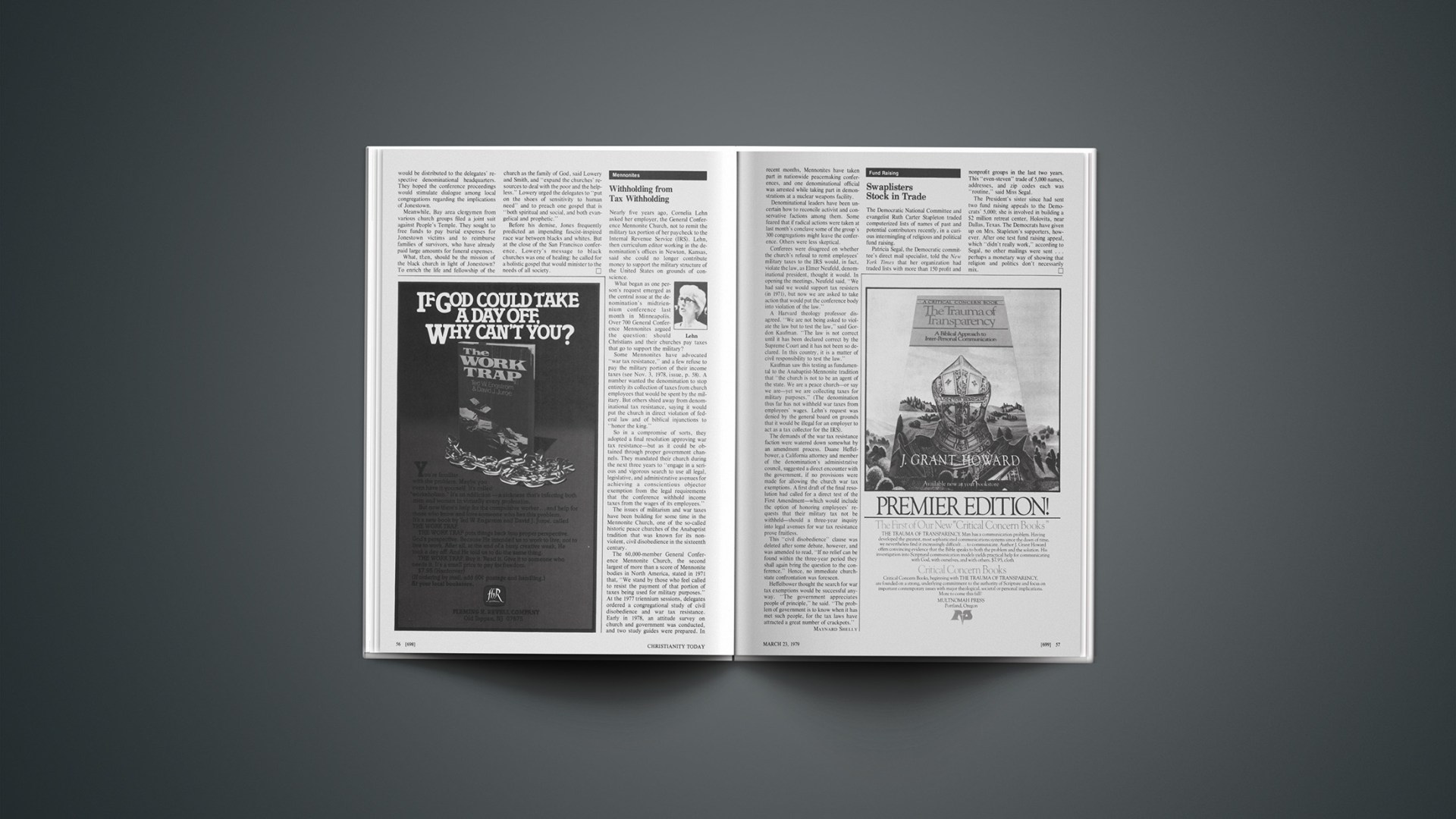Nearly five years ago, Cornelia Lehn asked her employer, the General Conference Mennonite Church, not to remit the military tax portion of her paycheck to the Internal Revenue Service (IRS). Lehn, then curriculum editor working in the denomination’s offices in Newton, Kansas, said she could no longer contribute money to support the military structure of the United States on grounds of conscience.
What began as one person’s request emerged as the central issue at the denomination’s midtriennium conference last month in Minneapolis. Over 700 General Conference Mennonites argued the question: should Christians and their churches pay taxes that go to support the military?
Some Mennonites have advocated “war tax resistance,” and a few refuse to pay the military portion of their income taxes (see Nov. 3, 1978, issue, p. 58). A number wanted the denomination to stop entirely its collection of taxes from church employees that would be spent by the military. But others shied away from denominational tax resistance, saying it would put the church in direct violation of federal law and of biblical injunctions to “honor the king.”
So in a compromise of sorts, they adopted a final resolution approving war tax resistance—but as it could be obtained through proper government channels. They mandated their church during the next three years to “engage in a serious and vigorous search to use all legal, legislative, and administrative avenues for achieving a conscientious objector exemption from the legal requirements that the conference withhold income taxes from the wages of its employees.”
The issues of militarism and war taxes have been building for some time in the Mennonite Church, one of the so-called historic peace churches of the Anabaptist tradition that was known for its nonviolent, civil disobedience in the sixteenth century.
The 60,000-member General Conference Mennonite Church, the second largest of more than a score of Mennonite bodies in North America, stated in 1971 that, “We stand by those who feel called to resist the payment of that portion of taxes being used for military purposes.” At the 1977 triennium sessions, delegates ordered a congregational study of civil disobedience and war tax resistance. Early in 1978, an attitude survey on church and government was conducted, and two study guides were prepared. In recent months, Mennonites have taken part in nationwide peacemaking conferences, and one denominational official was arrested while taking part in demonstrations at a nuclear weapons facility.
Denominational leaders have been uncertain how to reconcile activist and conservative factions among them. Some feared that if radical actions were taken at last month’s conclave some of the group’s 300 congregations might leave the conference. Others were less skeptical.
Conferees were disagreed on whether the church’s refusal to remit employees’ military taxes to the IRS would, in fact, violate the law, as Elmer Neufeld, denominational president, thought it would. In opening the meetings, Neufeld said, “We had said we would support tax resisters (in 1971), but now we are asked to take action that would put the conference body into violation of the law.”
A Harvard theology professor disagreed. “We are not being asked to violate the law but to test the law,” said Gordon Kaufman. “The law is not correct until it has been declared correct by the Supreme Court and it has not been so declared. In this country, it is a matter of civil responsibility to test the law.”
Kaufman saw this testing as fundamental to the Anabaptist-Mennonite tradition that “the church is not to be an agent of the state. We are a peace church—or say we are—yet we are collecting taxes for military purposes.” (The denomination thus far has not withheld war taxes from employees’ wages. Lehn’s request was denied by the general board on grounds that it would be illegal for an employer to act as a tax collector for the IRS).
The demands of the war tax resistance faction were watered down somewhat by an amendment process. Duane Heffelbower, a California attorney and member of the denomination’s administrative council, suggested a direct encounter with the government, if no provisions were made for allowing the church war tax exemptions. A first draft of the final resolution had called for a direct test of the First Amendment—which would include the option of honoring employees’ requests that their military tax not be withheld—should a three-year inquiry into legal avenues for war tax resistance prove fruitless.
This “civil disobedience” clause was deleted after some debate, however, and was amended to read, “If no relief can be found within the three-year period they shall again bring the question to the conference.” Hence, no immediate church-state confrontation was foreseen.
Heffelbower thought the search for war tax exemptions would be successful anyway. “The government appreciates people of principle,” he said. “The problem of government is to know when it has met such people, for the tax laws have attracted a great number of crackpots.”










